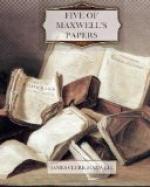But admitting that a practical acquaintance with the methods of Physical Science is an essential part of a mathematical and scientific education, we may be asked whether we are not attributing too much importance to science altogether as part of a liberal education.
Fortunately, there is no question here whether the University should continue to be a place of liberal education, or should devote itself to preparing young men for particular professions. Hence though some of us may, I hope, see reason to make the pursuit of science the main business of our lives, it must be one of our most constant aims to maintain a living connexion between our work and the other liberal studies of Cambridge, whether literary, philological, historical or philosophical.
There is a narrow professional spirit which may grow up among men of science, just as it does among men who practise any other special business. But surely a University is the very place where we should be able to overcome this tendency of men to become, as it were, granulated into small worlds, which are all the more worldly for their very smallness. We lose the advantage of having men of varied pursuits collected into one body, if we do not endeavour to imbibe some of the spirit even of those whose special branch of learning is different from our own.
It is not so long ago since any man who devoted himself to geometry, or to any science requiring continued application, was looked upon as necessarily a misanthrope, who must have abandoned all human interests, and betaken himself to abstractions so far removed from the world of life and action that he has become insensible alike to the attractions of pleasure and to the claims of duty.
In the present day, men of science are not looked upon with the same awe or with the same suspicion. They are supposed to be in league with the material spirit of the age, and to form a kind of advanced Radical party among men of learning.
We are not here to defend literary and historical studies. We admit that the proper study of mankind is man. But is the student of science to be withdrawn from the study of man, or cut off from every noble feeling, so long as he lives in intellectual fellowship with men who have devoted their lives to the discovery of truth, and the results of whose enquiries have impressed themselves on the ordinary speech and way of thinking of men who never heard their names? Or is the student of history and of man to omit from his consideration the history of the origin and diffusion of those ideas which have produced so great a difference between one age of the world and another?
It is true that the history of science is very different from the science of history. We are not studying or attempting to study the working of those blind forces which, we are told, are operating on crowds of obscure people, shaking principalities and powers, and compelling reasonable men to bring events to pass in an order laid down by philosophers.




